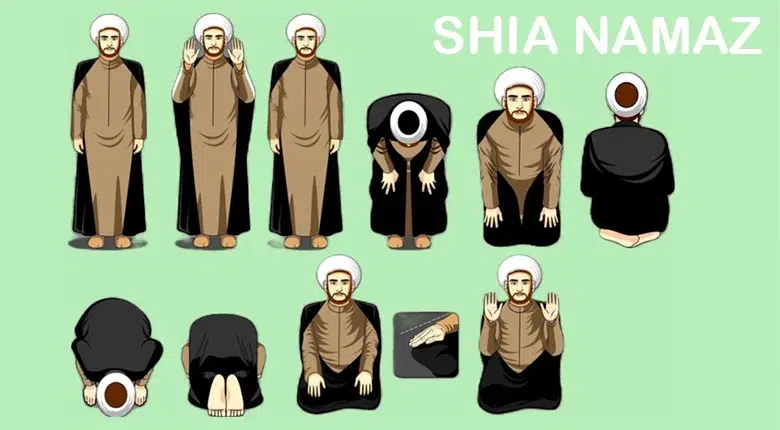
Why Shia Believes in Namaz 3 Times a Day: Exploring the Spiritual Significance
All Muslims are in agreement that there are five obligatory Namaz that take place at various times during both the day and night. They also believe that those five daily prayers has particular times in which they must be carried out and that merging the Namaz is at least occasionally permitted (saying the Zohar (noon) Namaz, followed right afterward by the Asar (afternoon) Namaz or saying the Maghrib (post-sunset) Namaz right away, followed by the Isha (night) Namaz.
It is permissible to combine the prayers while traveling, but the Maliki, Shafi’i, and Hanbali schools of thought believe that it isn’t permissible to combine the Namaz for any other purpose. Only on the day of Arafat is it permissible to combine the Namaz according to the Hanafi school of thought. In contrast, the Shi’a Muslim school of thought permits combining Namaz in any and all circumstances, including but not limited to when traveling or not, for whatever other cause, during war and peace, whether the weather is rainy or not, and so on.
The main point of the debate is to figure out when to begin and finish the prayer sessions. Therefore, in order to resolve the disagreement, the Holy Qur’an and the sayings of Muhammad need to be consulted.
The timing of prayers is addressed in the Holy Qur’an on three separate occasions. Allah, the Most Significant, declares:
“Pray from the middle of the day till the darkness of the night, then recite the Qur’an in the early hours of the morning.” In truth, the recitation of the Qur’an in the wee hours of the morning can always be noticed.
“The darkness of the night” belongs to the shared moment between the Maghrib and Isha prayer; “early morning” belongs to the fajr (dawn) prayer; and “mid-day” refers to the joint time of the Zohar and Asar prayer. The Holy Quran makes it abundantly obvious and explains in a straightforward manner that there are three primary periods for each of the five daily Namaz.
Even though there are five prayers, they can be broken down into three distinct periods of time. A Sunni scholar, Fakhar al-din al-Razi, also wrote this interpretation of this verse. The Zohar prayer has to be performed prior to the Asr prayer, and the Maghrib Namaz must be delivered before the Isha Namaz. It goes without saying that the prayers must be finished in the correct order.
Namaz Times In Holy Quran
Additionally, the Holy Qur’an states:
“And conduct the prayers at both the beginning and the end of the day, as well as at certain hours of the night. In fact, positive deeds neutralize the effects of bad deeds. That is a memory for those who are mindful.”
Researchers of the Quran and Muslim jurists are in agreement that the above verse relates to the five obligatory prayers. As the Holy Quran explains, it sets the timetable of the prayer—the three primary times: two of them at the “start of the day” and the third in “some hours of the night.” Muslim jurists agree that this verse belongs to the obligatory prayer.
The first “start of the day” is the time of the morning Prayer; the second “ends of the day” start at noon and end at sunset (making this the time for the Zohar and Asar prayer); and the “hours of the night” are the third and primary time in which the Maghrib and Isha prayer should be recited; both of theseprayer extend from the start of the night until midnight. The early-morning prayer is the first of the five daily Namaz that Muslims are required to recite.
In the third verse, which also contains a division of the period’s expression,
“So bear with patience (O Muhammad pbuh) all that they say, and glorify the praises of your Lord before the rising of the sun and before its setting; and during a part of the night, also glorify His praises; and in the same way, after the prostrations.”
As with the previous verse, the jurists and the commentators are in agreement that this verse refers to the times of the five obligatoryprayers. In addition, they divide the time for the Namaz into three segments: first, the time from dawn until sunrise, which is the time for the dawn Namaz (fajr); second, the time from noon until sunset, which is the time for the noon and afternoon Namaz; and third, the “part of the night,” which extends from after sunset until midnight, which is the time
Analysts believe that the phrase “And so likewise after the prostration,” which is found at the end of the verse that was given (50:39–40), relates either to the prayers that are recommended, known as Nawafil, or more specifically to the salat al-lail, which is one of the Namaz that are considered to be among the most highly recommended Namaz.
Bukhari and others say that the Prophet (pbuh) used to pray at the same time three times a day. “The Messenger of Allah prayed the noon and afternoon Prayers together and the sunset and night Prayers together, even when he was afraid or traveling,” they wrote.
The scholar Muslim relates the same hadees and adds that when the Prophet (pbuh) was asked by Ibn Al-Abbas why he authorized combining the two prayers, the Prophet (pbuh) said that he did not want to bring hardship for His ummah as He did not want to cause difficulties for His ummah.
Muslim narrates the same hadees. Ibn al-Abbas recounts the practice of combining the two Namaz during the time of the Prophet in the same book. He says that this was done in order to save time.
As an outcome of this, the Noble Qur’an as well as the tradition of the Prophet reveal unequivocal consent and approval to combine the two Prayers without there being any particular cause to do so. Additionally, it claims that Allah, the Most Merciful, simplified His religion for those who believed in Him.
- [1] Quran, 17:78
- [2] Fakhr al-Din al-Razi, Tafsir, Vol. 5, 428
- [3] Noble Quran, 11:114
- [4] Noble Quran, 50:39-40
- [5] Hadees 510 and 529 of Sahih al-Bukhari’s “Book on Times of Prayers”; Hadith 1103 of Sahih al-Bukhari’s “Book on Friday Prayers” Hadees 1146 of Sahih al-Muslim’s “Book on the Prayer of Travellers,” al-Tirmidhi’s “Book on Prayer,” and Hadees172 of al-Nisa’i’s “The 300th Hadees
- [6] Hadees 50–54 can be found in Sahih Muslim’s “Book of the Prayers of Travellers,” chapter 6.
- [7] Sahih Muslim, Ch. 6–8, Hadees 58–62




